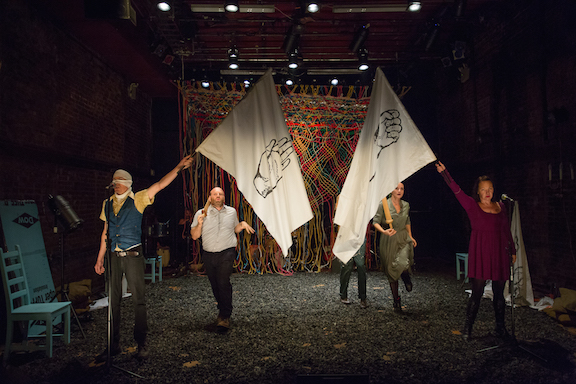The Tyranny of the Kinetic
Aaron Siegel
There are revolutions, and then there are REVOLUTIONS!!! I am not sure which category ‘cheap&easy OCTOBER’ falls into, but it’s squarely in that space one way or another. And by virtue of the tools it uses to create a theater experience, its fairly clear that creators Kara Feely and Travis Just don’t give a damn one way or another. If revolutions are the subject of ‘cheap&easy OCTOBER,’ as the program notes, waving banners, tense tableau’s, and monumental noise would have us believe, then it is salient to me that I don’t know a thing about revolutions. And perhaps this is the point after all. Starting with the revolution of 1917 as a touchstone, this 70-minute music drama threw into question the revolutions we have all witnessed over the last 40 years in Egypt, Ukraine, Tunisia, Iran, and countless other places. What is the nature of revolt? How do people work together to create the environment for collective action? How do the personal emotions at the heart of any movement—love, hate, jealousy—impact on the overall trajectory of the revolutionary experience? From the moment of the first clanging guitar chords and the entrance of a staggering man, his head wrapped fully in medical gauze, ‘cheap&easy OCTOBER’ provided a thrilling, ecstatic and hyperkinetic treatise on violence, community, and yes, revolution (or is it REVOLUTION!!!).
If we are going to talk about ‘cheap&easy OCTOBER’ we can’t very well start with anything resembling narrative. The whole first half of the piece was a highly choreographed ballet of repetitive gestures, most of them embedded with meaning – clanging a phone down on the receiver, swishing a sword, waving a flag, a chorus line of red-socked legs. These gestures seemed unattached particularly to any one of the 5 courageous, dedicated and thoroughly sweated-through performers who, through their sheer physicality, made this piece feel like a rugby scrum—Avi Glickstein, Tavish Miller, Daniel Allen Nelson, Fulya Peker and Deborah Wallace. Each of these characters picked up a predictable mélange of props (candelabra, epee, pink parakeet, umbrella, etc.) and independently played through a scene of their own making, the collective image resembling a melee of meaning and emotion. Facial gestures were a key component of the communicated drama. Each scowl, wicked smile, depressive frown, etc. was delivered with an overwrought emphasis that hinted at coyness.
Feely clearly has an obsession with tableau, though not necessarily in the traditional sense. She creates a buzzing energy (difficult to follow and absorb) and then just when you feel maxed out as a viewer, she stops the motion so the audience can sweep their eyes across the stage and start to relate the characters to one another. Her feel for spacing and gesture as so subtle that they feel improvised, but clearly she has sweated this stuff as much as her actors have. I had the feeling throughout the performance that each night of this two-week run would be very different from one another, and also that there is enough of a constancy in the direction that the action would unfold fairly identically, too.
None of the power of the first section of ‘cheap&easy OCTOBER’ would have been fully attained without the full-throated roar of Travis Just’s music, here performed by a dream collective of musicians—Andie Springer on violin, bass, percussion objects, Taylor Levine on guitar, bass, percussion, Owen Weaver on percussion, guitar and objects and Aaron Meicht on synthesizer, trumpet, percussion and objects. Their collective sound was a mass of distorted drones and pounding drums, seemingly made from the very matter of earth, but clearly highly organized and expertly executed. The impact of the musical onslaught was to fill the room with the disorienting energy of violence and political passion. Within this sea of sound waves, nicely mirrored in the hypercolor woven installation of Hannah Dougherty, the actor/performers seemed framed by a much larger, elemental energy. As a result, they seemed small, and gratefully less intimidating. I thought more than once about the rapturous (and ear-splitting) drones of Phil Niblock and the way that his sounds made the b-roll footage of his films seem like majestic ballets. Even when the sounds thinned out towards the end of the piece, and the action slowed to a hushed dialogue, or dramatic monologue, the damage of the sonic violence from the first half seemed still to linger in the air and produce a protective halo around the injured characters.
The second half of ‘cheap&easy OCTOBER’ was just as rich with imagery and sound as the first half, but somehow felt disappointing after the rage of the first half. Perhaps this was the point. After the bombs and the fires, the flag waving and heated discussions, what are the revolutionaries left with other than the detritus of their own making. There was a contemplative moment towards the end when violinist Springer and percussionist Weaver bounced ping-pong balls off the strings of Levine’s guitar, while a pile of pillows and people surrounded a plaintiff actress talking directly to the audience. The stillness and directness of this moment was shocking given the aural and visual cacophony it followed. Feely and Just, while seeming to embrace chaos and disorder, aren’t afraid to tell a straight story of trying and failing and trying again, all in the name of revolt.



